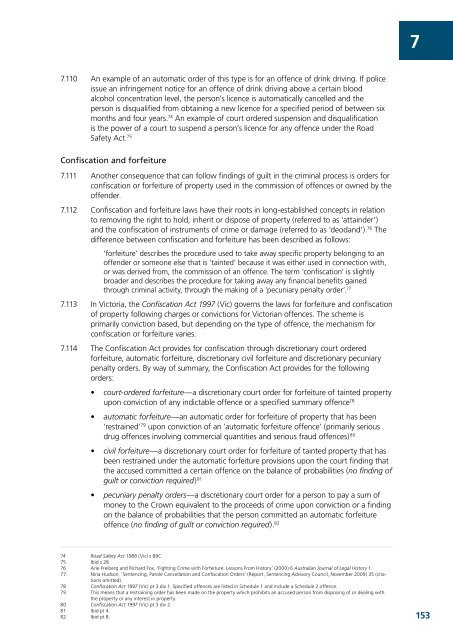Crimes Mental Impairment consultation paper.pdf - Victorian Law ...
Crimes Mental Impairment consultation paper.pdf - Victorian Law ...
Crimes Mental Impairment consultation paper.pdf - Victorian Law ...
You also want an ePaper? Increase the reach of your titles
YUMPU automatically turns print PDFs into web optimized ePapers that Google loves.
7<br />
7.110 An example of an automatic order of this type is for an offence of drink driving. If police<br />
issue an infringement notice for an offence of drink driving above a certain blood<br />
alcohol concentration level, the person’s licence is automatically cancelled and the<br />
person is disqualified from obtaining a new licence for a specified period of between six<br />
months and four years. 74 An example of court ordered suspension and disqualification<br />
is the power of a court to suspend a person’s licence for any offence under the Road<br />
Safety Act. 75<br />
Confiscation and forfeiture<br />
7.111 Another consequence that can follow findings of guilt in the criminal process is orders for<br />
confiscation or forfeiture of property used in the commission of offences or owned by the<br />
offender.<br />
7.112 Confiscation and forfeiture laws have their roots in long-established concepts in relation<br />
to removing the right to hold, inherit or dispose of property (referred to as ‘attainder’)<br />
and the confiscation of instruments of crime or damage (referred to as ‘deodand’). 76 The<br />
difference between confiscation and forfeiture has been described as follows:<br />
‘forfeiture’ describes the procedure used to take away specific property belonging to an<br />
offender or someone else that is ‘tainted’ because it was either used in connection with,<br />
or was derived from, the commission of an offence. The term ‘confiscation’ is slightly<br />
broader and describes the procedure for taking away any financial benefits gained<br />
through criminal activity, through the making of a ‘pecuniary penalty order’. 77<br />
7.113 In Victoria, the Confiscation Act 1997 (Vic) governs the laws for forfeiture and confiscation<br />
of property following charges or convictions for <strong>Victorian</strong> offences. The scheme is<br />
primarily conviction based, but depending on the type of offence, the mechanism for<br />
confiscation or forfeiture varies.<br />
7.114 The Confiscation Act provides for confiscation through discretionary court ordered<br />
forfeiture, automatic forfeiture, discretionary civil forfeiture and discretionary pecuniary<br />
penalty orders. By way of summary, the Confiscation Act provides for the following<br />
orders:<br />
• court-ordered forfeiture—a discretionary court order for forfeiture of tainted property<br />
upon conviction of any indictable offence or a specified summary offence 78<br />
• automatic forfeiture—an automatic order for forfeiture of property that has been<br />
‘restrained’ 79 upon conviction of an ‘automatic forfeiture offence’ (primarily serious<br />
drug offences involving commercial quantities and serious fraud offences) 80<br />
• civil forfeiture—a discretionary court order for forfeiture of tainted property that has<br />
been restrained under the automatic forfeiture provisions upon the court finding that<br />
the accused committed a certain offence on the balance of probabilities (no finding of<br />
guilt or conviction required) 81<br />
• pecuniary penalty orders—a discretionary court order for a person to pay a sum of<br />
money to the Crown equivalent to the proceeds of crime upon conviction or a finding<br />
on the balance of probabilities that the person committed an automatic forfeiture<br />
offence (no finding of guilt or conviction required). 82<br />
74 Road Safety Act 1986 (Vic) s 89C.<br />
75 Ibid s 28.<br />
76 Arie Freiberg and Richard Fox, ‘Fighting Crime with Forfeiture: Lessons From History’ (2000) 6 Australian Journal of Legal History 1.<br />
77 Nina Hudson, ‘Sentencing, Parole Cancellation and Confiscation Orders’ (Report, Sentencing Advisory Council, November 2009) 35 (citations<br />
omitted).<br />
78 Confiscation Act 1997 (Vic) pt 3 div 1. Specified offences are listed in Schedule 1 and include a Schedule 2 offence.<br />
79 This means that a restraining order has been made on the property which prohibits an accused person from disposing of or dealing with<br />
the property or any interest in property.<br />
80 Confiscation Act 1997 (Vic) pt 3 div 2.<br />
81 Ibid pt 4.<br />
82 Ibid pt 8.<br />
153

















